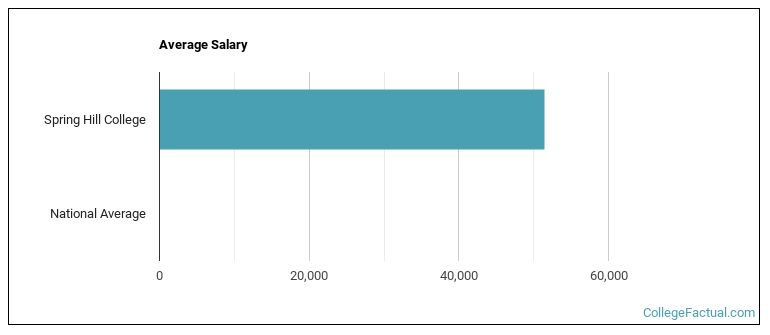 by our College Data Analytics Team
by our College Data Analytics TeamExplore the best ranked schools for the programs you are most interested in.
Spring Hill was not ranked in College Factual's Best Overall Colleges report this year. This may be because not enough data was available.
When it comes to admittance, Spring Hill College is somewhat selective. Its acceptance rate is 73%, which means you'll face some strong competition during the admissions process. Do what you can to make your application stand out.
About 3% of students accepted to Spring Hill submitted their SAT scores. When looking at the 25th through the 75th percentile, SAT Evidence-Based Reading and Writing scores ranged between 550 and 620. Math scores were between 560 and 610.
At Spring Hill, the student to faculty ratio is an excellent 12 to 1. That's much better than the national average of 15 to 1. This indicates that many classes will probably be small, and students will have ample opportunites to work closely with their professors and classmates.
When estimating how much access students will have to their teachers, some people like to look at what percentage of faculty members are full time. This is because part-time teachers may not have as much time to spend on campus as their full-time counterparts.
The full-time faculty percentage at Spring Hill College is 68%. This is higher than the national average of 47%.
The freshmen retention rate of 81% tells us that most first-year, full-time students like Spring Hill College enough to come back for another year. This is a fair bit higher than the national average of 68%. That's certainly something to check off in the good column about the school.
The on-time graduation rate for someone pursuing a bachelor's degree is typically four years. This rate at Spring Hill for first-time, full-time students is 46%, which is better than the national average of 33.3%.
Find out more about the retention and graduation rates at Spring Hill College.
During the 2017-2018 academic year, there were 1,061 undergraduates at Spring Hill with 1,034 being full-time and 27 being part-time.
| $0-30 K | $30K-48K | $48-75 | $75-110K | $110K + |
|---|---|---|---|---|
| $13,220 | $16,872 | $18,558 | $20,508 | $25,325 |
The net price is calculated by adding tuition, room, board and other costs and subtracting financial aid.Note that the net price is typically less than the published for a school. For more information on the sticker price of Spring Hill, see our tuition and fees and room and board pages.
While almost two-thirds of students nationwide take out loans to pay for college, the percentage may be quite different for the school you plan on attending. At Spring Hill, approximately 56% of students took out student loans averaging $6,429 a year. That adds up to $25,716 over four years for those students.

See which majors at Spring Hill College make the most money.
Get more details about the location of Spring Hill College.

Contact details for Spring Hill are given below.
| Contact Details | |
|---|---|
| Address: | 4000 Dauphin St, Mobile, AL 36608-1780 |
| Phone: | 251-380-4000 |
| Website: | https://www.shc.edu/ |
| Most Popular Majors | Bachelor’s Degrees | Average Salary of Graduates |
|---|---|---|
| Business Administration & Management | 125 | NA |
| Nursing | 19 | NA |
| General Biology | 17 | NA |
| Religious Studies | 15 | NA |
| Communication & Media Studies | 13 | NA |
| Health Sciences & Services | 13 | NA |
| General Psychology | 13 | NA |
| Liberal Arts General Studies | 12 | NA |
| Political Science & Government | 11 | NA |
| Teacher Education Grade Specific | 10 | NA |
Online courses area a great option for busy, working students as well as for those who have scheduling conflicts and want to study on their own time. As time goes by, expect to see more and more online learning options become available.
In 2022-2023, 539 students took at least one online class at Spring Hill College. This is a decrease from the 730 students who took online classes the previous year.
| Year | Took at Least One Online Class | Took All Classes Online |
|---|---|---|
| 2022-2023 | 539 | 128 |
| 2021-2022 | 730 | 152 |
| 2020-2021 | 915 | 112 |
| 2018-2019 | 70 | 59 |
If you’re considering Spring Hill College, here are some more schools you may be interested in knowing more about.
Curious on how these schools stack up against Spring Hill? Pit them head to head with College Combat, our free interactive tool that lets you compare college on the features that matter most to you!
Footnotes
*The racial-ethnic minorities count is calculated by taking the total number of students and subtracting white students, international students, and students whose race/ethnicity was unknown. This number is then divided by the total number of students at the school to obtain the racial-ethnic minorities percentage.
References
More about our data sources and methodologies.